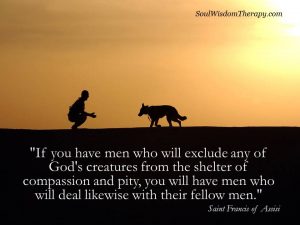What does one’s relationship with the natural world and animals say about that person’s relationships with other humans? That is the topic of many sociological and anthropological studies. It is clear that human disregard for the sanctity of life is a warning sign. If a person is cruel to animals, there is an increased likelihood of him or her being cruel to other people as well. The person who believes “It’s only a dog” has no understanding of the reality of the natural world.
Some crime statistics show a history of violence toward animals in youth and young adults who later commit violent acts against humans. A vast majority of domestic violence survivors relate that their partner injured or killed a family pet.
 More benign forms of abuse occur in cases of neglect. When a person neglects basic care for pets, they are more likely to ignore the needs of others in a household. We have all seen news reports of neglect and hoarding situations in which pets and children or elders are involved.
More benign forms of abuse occur in cases of neglect. When a person neglects basic care for pets, they are more likely to ignore the needs of others in a household. We have all seen news reports of neglect and hoarding situations in which pets and children or elders are involved.
On a more positive note, those who cherish the natural world, seeing the value in living things, can appreciate and nurture those people with whom they have relationships. These people understand that everything has a place in the world, from the smallest of insects to the largest of mammals, and all have an innate intelligence.
It is important to educate children about proper care of all living things, most especially animals and other people. Teaching a toddler that pulling the cat’s tail hurts, or teaching an older child that the family dog gets hungry just as he or she does, can establish important understandings that animals have physical, emotional and social needs just as we do. The child who learns about nurturing and basic care for a pet, and how that relates to caring for others, can retain those important lessons, making him or her a more caring, empathetic adult.
